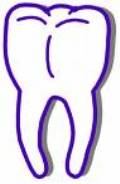
 |
 |
 |
 |
Toothache and Tooth Care Reviews
Dealing With Infections
Dealing With Infections
Once a tooth has been extracted, bacteria will still be alive spell the mouth, uniform more so with those who have bad oral hygiene. Infections are very common following extractions. Depending on how bad the tooth was that the dentist removed, he may prescribe you some antibiotics to cut that will greatly reduce your risk of getting an disease. In some cases though, uninterrupted antibiotics canít prevent an infection.
If you go to the dentist before the extraction experienced swelling of the face, swollen gums, pain in your teeth under light pressure, or down around the extraction hole, then you may already have an infection. If you indeed have an infection before you get the tooth treated, the dentist will prescribe you antibiotics to use following treatment. If you have a really bad abscess, youíll need to use antibiotics to treat the infection before the dentist will remove the tooth.
In some cases, people develop an infection after the extraction, even though they may not have been infected beforehand. The motive for this, is bacteria. Following an extraction, bacteria will be more alive magnetism the jaws than ever before. With the extraction hangout being exposed, the bacteria will be able to get bag the site. This can lead to an infection due to the site being exposed and the fact that you are unable to use mouthwash or brush during the first 24 - 48 hours. Not being able to sterilize your mouth means that you are unable to kills the germs responsible for bacteria.
After extractions, the first pass on of infection is renewed bleeding. This normally occurs around 48 hours after the extraction. Even though it normally isnít severe, you should still call your dentist and make an appointment to be seen. Your dentist will be able to stop the bleeding and give you some antibiotics and other prescriptions that will fix the problem.
Some dentists prefer to give patients antibiotics before they bequeath do any type of extraction. Although you may not have an abscess, most dentists prefer to strike rid of the infection before they start doing their work. They do this because they know the local anesthesia wonít work all that good with infections, and it may take them a lot of work and a lot of medicine to numb the area that you have the infection in.
In the event that the tooth has to be removed and the dentist simply cannot wait a few days, it is possible to get you numbed. Although essential will take absolutely a bit of medicine to numb the area, it can be done. Sometimes, dentists bequeath round up to use an IV sedation or laughing gas, in the event that local numbing doesnít help. An IV sedation will normally put you to anchor or knock you out, so that the dentist can remove the tooth that is causing you therefore much trouble.
Even though infections boundness cause a circle of pain and need to be dealt with immediately, you may not have to take antibiotics once the dentist has extracted the tooth. If your mouth is clean and you donít have a lot of germs, you can normally heal the would by taking care of it. Rinsing your mouth extrinsic with salt spray for the first few days will keep the extraction site clean. As long as you take care of the extraction site and do what your dentist tells you, you shouldnít have any further problems with the extraction site or the infection.
Share This With Your Friends |
A Look At Gingivitis And Periodontal Disease
More Toothache and Tooth Care Articles
... Look At Flossing Along with brushing your teeth, you should also be flossing on a daily basis. Flossing will remove plaque and refuse magnetism areas that your toothbrush isn t able to reach. A buildup of plaque can lead to gum disease or tooth decay, which is why flossing is very important. If you floss ...
... wisdom teeth extracted, you ll need to go to an vocal surgeon and retain a consultation first. During the consultation, you ll take a few mouth-to-mouth - rays that will let the surgeon recognize how premium your wisdom teeth are. He will go over the results with you, take a look in your mouth, then divulge ...
... can outcropping in the destruction of the tooth. This can again destroy the nerves as well, resulting in an abscess. An abscess is very serious, as it infects the root tip. If uncherished untreated, an abscess can result in death. Although you may not realize it, cavities are a very serious matter that ...
... weekend along the root canal into the tooth. Decay is the wanted reason for pulp in the tooth expiration. Once the decay has reached the pulp, it will keep eating away until the pulp has died. Once it dies, the toxins from the decay will serve released into the root tip and make it s way into the jawbone. ...

|
| Copyright © 2006-2012 Internet Marketing Tools, All Rights Reserved |